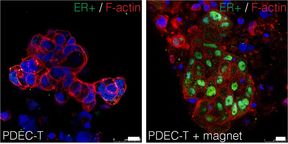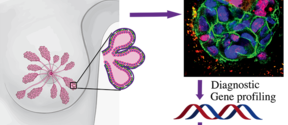Novel 3D matrix will allow predictive and effective breast cancer treatment
The extracellular matrix keeps the structure of the tumour tissues unchanged and thereby allows correct and personalized drug identification.

Breast cancer is currently the most common form of cancer among the working age in Finland. Most breast cancers belong to a so-called hormone receptor-positive subtype. This means that there are hormone receptors on the cancer cells that receive hormones from the body and trigger a chain reaction that increases cancer growth.
These breast cancers can be effectively treated with hormone therapies. However, in 40 percent of the cases the effectiveness of the treatments decreases over time until it becomes difficult to control cancer with medication. Additionally, it is problematic to study the effects of hormone therapies, the lack of treatment response, and new therapies that may be effective in unresponsive cancers as hormone receptors disappear completely from breast cancer cells under laboratory cell culture conditions.
Researchers at the University of Helsinki and Aalto University have found a way to keep the hormone receptors under laboratory conditions in their gel-grown mini-breast cancers. This discovery opens new avenues for the development of hormonal therapies, the study of individual drug responses, and the elucidation of the mechanisms of drug resistance.
For some time, professor Juha Klefström's group at the University of Helsinki has studied why hormone receptors disappear when breast cancer cells or pieces of cancer tissue are transferred from breast cancer surgery to cell culture.
‘Although we had rummaged through almost all possible growth factors and culture media, the study did not really produce results. The hormone receptors always disappeared,’ says University researcher Pauliina Munne about the background of the study.
Then it became clear to the researchers that the answer for this complex biological question requires an interdisciplinary approach by combining cancer biology with materials chemistry and soft matter physics.
‘It was only when we mimicked the natural mechanical properties that breast tissue experiences, such as high stiffness, that we were able to keep the hormone receptors present in cancer cells. To our great delight, they also acted as hormone receptors should, and most importantly, based on our results, we were able to block their action with a new generation of hormone drugs,’ Munne rejoices.
The recent results are an example of the power of co-operation between different disciplines. The study integrates the traditionally strong knowledge of cancer biology from the University of Helsinki's with a long tradition of top research in material sciences from Aalto University.
‘This is a textbook example of how crossing different fields of research can create completely new types of breakthroughs. It is important to be able to ask concrete questions across various areas of expertise, says research partner,’ Professor Olli Ikkala from Aalto University.
‘Our ability to control the mechanical, biochemical and chemical functionalities of the hydrogel-based nanoscaffolds offers long-term study of patient-derived tissues, paving the way for a novel and predictive preclinical model,’ says Nonappa, Associate Professor at Tampere University and Adjunct Professor at Aalto University, who led the material science part of this work.
The research group leader, Juha Klefström, a FICAN research professor at the Finnish Cancer Institute, has been actively in contact with Finnish cancer centers and pharmaceutical companies with the aim of using the patentable mini-breast cancer model to promote drug development for hormone-positive breast cancers.
”In the study, we preliminarily tested our mini-breast cancer model with a new generation of hormone drugs offered by a US pharmaceutical company, and the results were very promising. I believe that a whole new chapter is now opening in the fight against hormone receptor-positive breast cancer,” Klefström says
At the same time, Klefström gives recognition to Finnish breast cancer patients.
”This study would not have been possible in any way without the participation of Finnish breast cancer patients in our study. The study involved more than 400 people with breast cancer or those who had undergone breast reduction surgery. By donating surplus tissue from the surgery to our study, these individuals and our good collaboration with HUS have enabled the development of the mini-breast cancer model,” Klefström says.
”Personally, I strongly believe that cooperation between patients, researchers from different disciplines, cancer doctors and other healthcare professionals is ultimately the only way to finally defeat breast cancer,” Klefström concludes.
Original article: Pauliina M. Munne, Lahja Martikainen, Iiris Räty, Kia Bertula, Nonappa, Janika Ruuska, Hanna Ala-Hongisto, Aino Peura, Babette Hollmann, Lilya Euro, Kerim Yavuz, Linda Patrikainen, Maria Salmela, Juho Pokki, Mikko Kivento, Juho Väänänen, Tomi Suomi, Liina Nevalaita, Minna Mutka, Panu Kovanen, Marjut Leidenius, Tuomo Meretoja, Katja Hukkinen, Outi Monni, Jeroen Pouwels, Biswajyoti Sahu, Johanna Mattson, Heikki Joensuu, Päivi Heikkilä, Laura L. Elo, Ciara Metcalfe, Melissa R. Junttila, Olli Ikkala, Juha Klefström. Compressive stress-mediated p38 activation required for ERα + phenotype in breast cancer. Nature Communications 12, 6967 (2021) https://doi.org/10.1038/s41467-021-27220-9
Olli Ikkala
Professor
Aalto University
olli.ikkala@aalto.fi
+358 50 410 0454
Nonappa
Ph.D., Docent, MRSC
Associate Professor (tenure track) in Nanochemistry
Tampere University
nonappa@aalto.fi
+358 50 472 8897
Juha Klefström
FICAN Research professor, Finnish Cancer Institute and HUS
Research Director, University of Helsinki
juha.klefstrom@helsinki.fi
+358 44 377 3876
Pauliina Munne
University researcher
University of Helsinki
pauliina.munne@helsinki.fi
+358 50 3210761

The extracellular matrix keeps the structure of the tumour tissues unchanged and thereby allows correct and personalized drug identification.

The sharpest tip of materials science is coming up with answers to questions such as can materials ‘learn’ new properties or how to keep a cancerous tumour alive outside the body.



